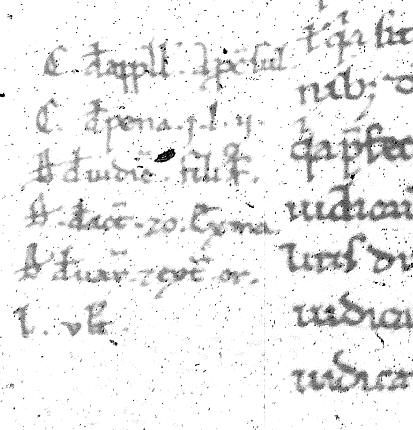|
Bulgarus De arbitris Vat. lat. 8782, fol. 95rb |
|
D de iudic. Filiusfamilias (Dig. 5.1.15): Filius familias iudex si litem suam faciat, in tantam quantitatem tenetur, quae tunc in peculio fuit, cum sententiam dicebat. Iudex tunc litem suam facere intellegitur, cum dolo malo in fraudem legis sententiam dixerit (dolo malo autem videtur hoc facere, si evidens arguatur eius vel gratia vel inimicitia vel etiam sordes), ut veram aestimationem litis praestare cogatur. (If a filius familias acts fraudulently as judge and he makes himself liable to damages, he is liable to the extent of the amount of his peculium at the time when he gave his decision. A judge is thought to make himself liable for damages when he has fraudulently given a decision contrary to the law --- he seems to do this by dolus malus if it be evident that he acted from favor, enmity or baseness --- so that he must pay a true estimate of the cost of the trial) D de uar. et extraord. l.ult. (Dig. 50.13.6): Si iudex litem suam fecerit, non proprie ex maleficio obligatus videtur: sed quia neque ex contractu obligatus est et utique peccasse aliquid intellegitur, licet per imprudentiam, ideo videtur quasi ex maleficio teneri in factum actione, et in quantum de ea re aequum religioni iudicantis visum fuerit, poenam sustinebit. (If a judge renders decisions fraudulently, he is not strictly obligated because he has committed a crime, but although he is not bound under the law of contract, he is understood to have failed, even if through ignorance, and so is obligated almost as if he had committed a crime and has been judged in court. Consequently, he shall receive an punishment that seems equitable to a scrupulous judge) (cf. Vat. lat. 8782, fol. 83v, Inst. 4.5pr, in which the gloss gives the same three citations to Digest) |
